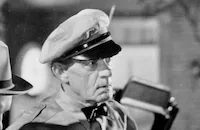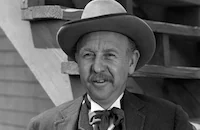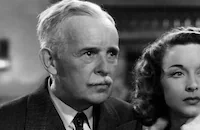Little Men

Brief Synopsis
Cast & Crew
Norman Z. Mcleod
Kay Francis
Jack Oakie
George Bancroft
Jimmy Lydon
Ann Gillis
Film Details
Technical Specs

Synopsis
Confidence man Major Burdle experiences a regeneration when he is stuck caring for the infant son of a dear departed friend. After reluctantly accepting the boy, Danny, as his own son, the major indoctrinates him in the profession of selling a cure for drunks until the school board demands that the boy be enrolled in school. The major takes Danny to Plumfield, the school run by Jo and her husband, the Professor. There, the Professor, in need of $5,000 to fend off the bank's threat of foreclosure, entrusts the major to invest the school's savings. The major invests the money in an Omaha bank, but when the bank fails, the money is lost. Disgraced by his father's loss of Plumfield's funds, Danny gets in a publicized fight with one of his schoolmates, and the major, desperate to recover the money, forges a check and returns to Plumfield just in time to save the school from foreclosure. However, as the major turns over the cash, the town constable arrives to arrest him for forgery. All ends happily, however, as the school is saved by Willie the Fox, the major's escaped bank robber friend, who turns himself in for a $5,000 reward, which he presents to Plumfield.

Director

Norman Z. Mcleod
Cast

Kay Francis

Jack Oakie

George Bancroft

Jimmy Lydon

Ann Gillis

Charles Esmond

Richard Nichols
Casey Johnson
Francesca Santoro
Johnny Burke
Lillian Randolph
Sammy Mckim
Edward Rice
Anne Howard
Jimmy Zahner
Bobbie Cooper
Schuyler Standish
Paul Matthews
Tony Neil
Fred Estes
Douglas Rucker
Donald Rackerby

William Demarest

Sterling Holloway

Isabel Jewell
Elsie
Sarah Edwards
Bud Jamison
Hal K. Dawson
Russ Powell

Lew Kelly

George Irving
Nora Cecil

Charles Arnt
Jack Henderson
Stan Blystone
Bill Irving
Duke York
George Green
Clarence H. Wilson

Howard Hickman

Nella Walker
Crew
Graham Baker
Arthur Caesar
Donald J. Ehlers
Al Herman
George Hively
Mark Kelly
Nicholas Musuraca
Van Nest Polglase
Sam Ruman
Darrell Silvera
Edward Stevenson
Gene Towne
Gene Towne
John E. Tribby
Vernon L. Walker
Roy Webb

Film Details
Technical Specs

Articles
Little Men
Nowadays, if people have heard of Kay Francis, it's because of the critical witticism dismissing her as "the wavishing Kay Fwancis" because of her subtle lisp. It's a quote often attributed to Dorothy Parker, but the sharp-witted writer would never have said that about her friend Kay. The two women were fast friends with much in common; both had a freewheeling love life and a healthy appetite for drink. (Francis's prolific diary marks this entry for January 1st, 1936: "Beginning the new year with my lover. May he be in the same bed with me next year this time.") The studio bosses who really coined the "wavishing" jab knew about Francis's appetite for living, and yet still tapped her for the role of saintly schoolmarm Jo Bhaer (nee March) in Little Men (1940), the second screen adaptation of Louisa May Alcott's sequel to Little Women. Francis's private life might have been juicy diary fodder, but on-screen she made her sizable salary (between $3000 and $4500 a week in her best years) perfectly embodying long suffering, good-hearted women who, no matter their melancholy difficulties, always remained beautifully dressed.
Alcott's original book puts Jo front and center, but this screen adaptation focuses instead on young Dan (Jimmy Lydon, fresh from his star-making title role in Tom Brown's School Days (1940), opposite Freddie Bartholomew), a foundling left in infancy with con man Maj. Burdle (George Bancroft), a medicine show huckster who trains his young charge in his free and easy lifestyle. When a truant officer catches up with Dan, he's enrolled at Plumfield, the halcyon boarding school run by Jo and her Swiss husband (the Austrian born actor Carl Esmond). Dan proves a difficult convert to Plumfield life, scandalizing his teachers by playing ribald songs on the concertina and teaching kids to blow smoke rings out by the barn. However, Jo's gentility and progressive child rearing philosophies - children are punished by being forced to hit her with a switch - wins out.
Kay Francis might have been the leading lady, but Little Men's bovine co-star gets her fair share of screen time. Billed in the opening credits as "The Moo Girl of the New York World's Fair", the long-lashed Jersey dairy cow born "You'll Do Lobelia" found stardom when she was plucked from the herd tethered to the "Rotolactor" milking machine at the Borden Milk pavilion at the 1939 World's Fair. When executives realized the question most asked by curious spectators was "Which one is Elsie?", they rechristened their gentlest animal after Borden's cartoon trademark and festooned her with a garland of daisies. Elsie's owners were so possessive of their barnyard starlet they demanded a brass band welcome, a parade, and a personal appearance by Francis greeting Elsie at the train station, in exchange for her unpaid role in the film. (Francis's reaction to being asked to welcome a cow has gone unrecorded, although one account remarked that at their first meeting, Elsie added injury to insult by stepping on Francis's toes.)
Elsie's absurdly prominent stature in the cast in the role of "Buttercup" did not go unnoticed by critics. Bosley Crowther sniffed in The New York Times, "For the record, it should be stated that this is the picture in which Elsie, the much-publicized cow, played a role." He goes on to dismiss Francis's performance as "too sweet and good" and the entire movie as "maudlin and smarty-smart, too obviously rigged for tears and laughs." Twisting the blade, he does grudgingly give credit to Elsie for being "true to Miss Alcott's Buttercup."
Elsie's stardom was short lived. The cow was euthanized after suffering injuries in a road accident the following year. Francis's days as a box office queen were similarly numbered. Her bosses hadn't overlooked how her weekly paycheck outdistanced what they were making, and reasoned that Bette Davis could take over the noble suffering women roles for half of Francis's price. (Cruelly, they didn't fire Francis, but made sure to give her scripts filled with "r" words to bring her speech impediment to the forefront and humiliate her into leaving.) Francis wouldn't leave without a fight, but time bestowed an unfair obscurity upon this former matinee goddess. How forgotten is Kay Francis today? Consider this: Andy Warhol immortalized Elizabeth Taylor, Marilyn Monroe and other movie stars in his paintings, but he never made a portrait of Kay Francis. The subject of his Cow Wallpaper (1966), however, looks very much like Elsie.
Producer: C. Graham Baker, Gene Towne
Director: Norman Z. McLeod
Screenplay: Mark Kelly, Arthur Caesar (screenplay); Louisa May Alcott (novel); Jack Wagner (uncredited)
Cinematography: Nicholas Musuraca
Art Direction: Van Nest Polglase
Film Editing: George Hively
Cast: Kay Francis (Jo March), Jack Oakie (Willie the Fox), George Bancroft (Maj. Burdle), Jimmy Lydon (Dan), Ann Gillis (Nan), Charlse Esmond (Prof. Bhaer), Richard Nichols (Teddy), Casey Johnson (Robby), Francesca Santoro (Bess), Johnny Burke (Silas).
BW-83m. Closed Captioning.
by Violet LeVoit
References:
Crowther, Bosley. "THE SCREEN; 'Little Men,' Featuring Kay Francis and Jack Oakie, at the Rivoli--Charles Royer in 'Les Amoureux'" The New York Times, December 9, 1940.
Lamparski, Richard. Whatever became of-- ?: Eighth series. Random House, 1985.
Kear, Lynn and John Rossman. Kay Francis: A Passionate Life And Career. McFarland and Company, 2006.
Dennis, Jeffery P. We Boys Together: Teenagers in Love Before Girl-Craziness. Vanderbilt University Press, 2007.
You'll Do Lobelia's grave in Plainsboro, NJ: http://www.findagrave.com/cgi-bin/fg.cgi?page=gr&GRid=7449959

Little Men
Quotes
Trivia
Buttercup was played by Borden's Elsie the Cow.
Notes
According to news items in Hollywood Reporter and Los Angeles Times, producers Gene Towne and Graham Baker originally wanted Edward G. Robinson for the role of "Burdle" and Jean Hersholt for the role of "the Professor." Elsie, who plays "Buttercup," was the Borden Milk cow. The film was criticized by the New Yorker as subverting the Louisa May Alcott novel by adding an underworld plot. Modern sources note that Towne and Baker had an uncredited hand in the screenplay. In 1934, Mascot filmed a version of the Alcott novel. For more information on other versions of Alcott's works, for Little Women.














